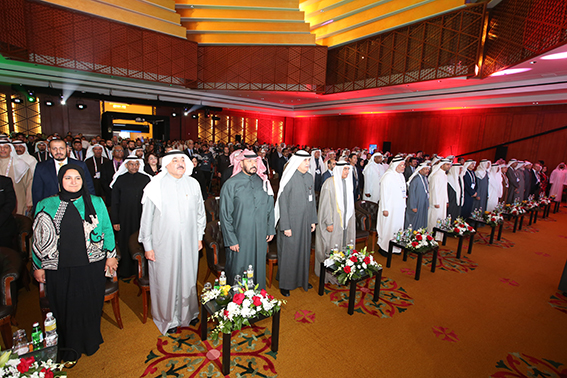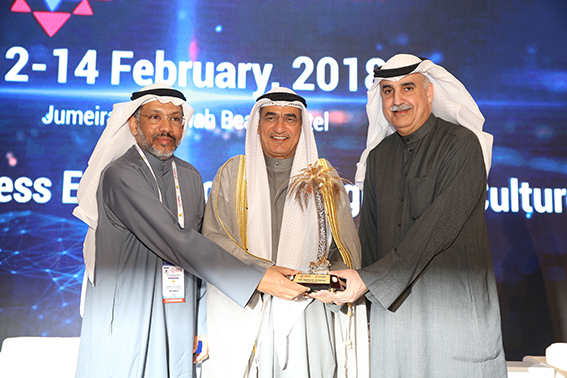Against the backdrop of continued development of global oil industry, and the need to inject more investment in this field, 6th International Conference & Exhibition on HSE was convened in Kuwait for the first time to reaffirm the importance of the role that Kuwait plays through its oil sector. Convening the conference in Kuwait is an additional proof of the importance the country accords to improving work environment with a view to provide the highest standards of safety for people and environment alike.
Convening the conference under the theme "Driving Business Excellence through HSE Culture", comes amid difficult conditions and many challenges that face global oil markets which it has to adapt to in order to ensure growth and sustainability. Thus, it is very important to remember that K-Companies strive to optimize work methods in way that ensures disseminating the culture of HSE across society in general, and its employees in particular, through developing ethical and professional conduct.

An Opportunity for Different Industries
The conference, which was hosted by KPC in cooperation with the Gulf Downstream Association, was launched at the Jumeirah Hotel in the presence of a host of officials, guests, consultants, experts, invitees and interested persons. Kuwait Minister of Oil and Minister of Electricity and Water Bakheet Al-Rashidi, KPC CEO Nizar Al-Adasani, KOC CEO Jamal Abdul-Aziz Jaafar and KNPC CEO Mohammad Ghazi Al-Mutairi, were among the senior attendees.
In his opening remarks, Al-Rashidi welcomed the audience and confirmed that the oil sector in Kuwait is keen on complying with health and safety conditions and standards. He said that the conference is an extraordinary event at the local, regional and international levels. He added that the conference is a valuable opportunity for the various parties of industry such as oil, gas, aviation, transportation and health to gather and identify the challenges and developments they are facing. He stressed that the interest of society and the environment is top priority at K-Companies in their pursuit to disseminate the culture of health and safety.

Adopting Best Practices
For his part, KPC CEO Nizar Al-Adasani, said that business development needs to adopt a proactive health and safety culture that focuses on accident prevention instead of a culture of reaction based on cost management and impact after the accident. He stressed the need to ensure absolute compliance with global safety standards and adopt the best practices for companies of all types to shift the focus of their safety strategies from traditional "accident control" to integration of risk management practices as part of their daily activities.
Al-Adasani also said that KPC prides in 2040 strategy that calls to achieve excellence in HSE, pointing out that the strategic directions of KPC focus on the need to comply with national and international standards and conditions to strengthen SHE system of management and standardization, with a view to prevent accidents and reducing emissions from its operations. The strategy was also aimed at building knowledge, awareness and capacity in HSE, he added.
He noted that the high rate of gas flaring in upstream operations within Kuwait was one of the most important operational challenges that has environmental and economic impacts, explaining that KPC strategy seeks to reduce gas flaring and emissions to meet international conditions and standards. He also pointed out that KPC has allocated "millions of dollars" to develop current and future projects to achieve excellence in maintaining HSE.
He said that the Board of Directors of KPC has adopted procedures to initiate "Al-Dibdiba Solar Power Project”, which comes as a culmination of efforts to preserve the environment, and expressed pride in transforming the buildings of KPC and subsidiaries to environmentally friendly ones.

Reducing Costs, Integrating Capabilities
Addressing the conference, KNPC CEO Mohammad Ghazi Al-Mutairi stressed that meeting the growing demand for energy is highly risky, noting that through vigilance, discipline and safety, innovative ways of managing risks can be found.
Al-Mutairi also said that social and economic responsibility requires focusing on reducing costs and integrating capabilities while maintaining a safe and environmentally friendly working environment in order to reach the best combination of productivity and maximize profitability towards sustainable development.
Al-Mutairi pointed out that hosting and organizing the conference is a pride and a privilege for KPC, in cooperation with Gulf Downstream Association. He added that the conference has succeeded in building a reputation as a technical platform to communicate and learn about the latest developments in HSE.
Al-Mutairi stressed that HSE practices are vital in all industries, especially in the oil and gas sector as the main driver of Kuwait’s economy. He added that the Middle East has not stopped promoting the use of renewable energy resources on a large scale to reduce greenhouse gas emissions, and boost economy by creating jobs and supporting investment in the private sector.
Al-Mutairi referred to the Al-Shiqaya Renewable Energy Project, Saudi Arabia's “Farasan Solar Power Plant” and “Masdar City Energy Project” in the UAE. The culture of HSE begins with the leadership that leads the behavior that in turn establishes the company culture, he said. He pointed out that KNPC has established systems for the management of HSE to ensure that it is appropriate and effective. He explained that KNPC monitors, measures and sets standards for everything related to its performance in HSE, in terms of emissions, excess water or noise levels.
Role of HSE Concepts
Then, Minister Al-Rashidi, accompanied by a number of guests, opened the exhibition, in which dozens of companies, ministries and various bodies participate and display their HSE related products and services. This was followed by a plenary session of oil leaders on the culture of HSE in companies and institutions, and how it could lead to excellence in business. KOC CEO Jamal Jaafar, Bahrain’s Bana Gaz CEO Sheikh Mohammed Al-Khalifa, Schlumberger's HSE director Jim Andrews, Total Downstream Operations Bernard Bental, and CEO of L&T Oil & Gas Engineering Subramanian Sarma. In the session, which was chaired by NEBOSH CEO Teresa Bodworth, the participants discussed the role of HSE concepts in providing a safe working environment, achieving goals and sharing best practices and ideas on understanding dynamic processes to develop such a strong culture.

KOC Working Paper
KOC, represented by the Safety Team, participated in the conference. Team Leader (Safety), Eng. Yousef Al-Qallaf, presented a technical paper on "Kuwait Oil Company's Initiative to Develop Road Safety Procedures". In the paper, Al-Qallaf sought to monitor and analyze car accidents on the Company's roads, control strategies, and reduce injuries and fatalities resulting from road accidents. In its strategy, the Company focuses on implementing a safe driving policy, raising awareness among employees and contractors, developing roads, providing warning signs, warning and lighting, providing vehicles with self-monitoring tools, and clarifying the Company's return because of reducing accidents and traffic violations.
Working Papers, Workshops and Lectures
The three-day conference discussed innovations and inventions to develop the HSE environment by increasing environmental standards and developments in the oil industry, as well as improving the business environment to play a key role in ensuring the safety of employees. Motivating employees and contractors to follow the highest standards in the oil industry and the role of governments in training and training cadres at the highest international standards were also discussed. The conference included three main concurrent tracks: Health, Safety and Environmental. A number of issues of interest to many sectors of the oil industry were discussed through papers, lectures and workshops such as Process Safety Management, Occupational Health, Sustainability, Best Practices, Road and Transport Security, Environmental Management, Health and Safety Culture, Health Challenges Safety in Project Management and Emergency and Crisis Management, by local and international experts. These discussions were aimed at educating participants and introducing them to the advantages of proactive policies and effective HSE management systems. The conference thus provided an in-depth coverage of topics related to the development of a sustainable HSE culture.